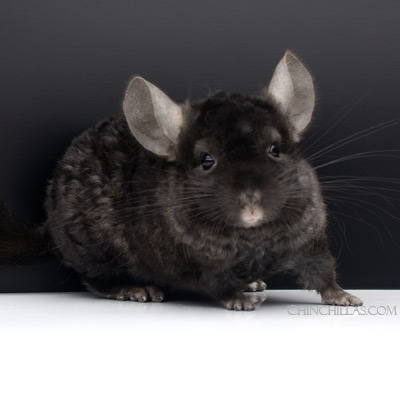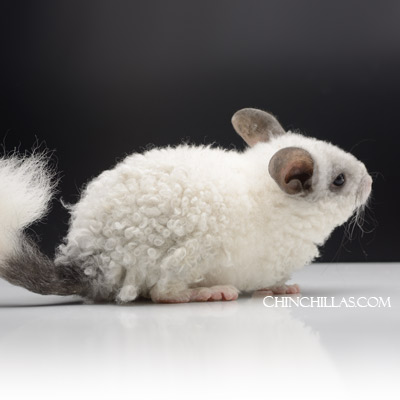Locken / Curly Chinchillas

Dark Tan Locken Chinchilla
The ebony related curly chinchilla mutation is relatively new. In December of 2007, Chinchillas.com facilitated the import of a small group of five curly chinchillas into the United States from Germany. The original imports were outcrossed to expand the relatively small gene pool and to increase quality. Four of the five imported curly chinchillas produced offspring, and most US bred curly chinchillas descend from these four animals.
 From October through December of 2010, Chinchillas.com sponsored a naming contest for the new curly chinchillas. People from around the world were invited to participate. Many potential names were suggested, with ‘Furled,’ 'Rex' and ‘Locken’ among the top choices. The ultimate winner was Locken, which is the German word for curly. In December of 2010 the first US-bred Locken (a carrier) to be offered on the Chinchillas.com Auction was purchased by Mr. Jinsong Pang of Hong Kong. Fully curled ebony Lockens, tan Lockens, and ebony and white mosaic Lockens soon followed. In March of 2017 the first Locken / Royal Persian Angora hybrid was offered on the Auction. The new hybrid was named the Royal Imperial Angora.
From October through December of 2010, Chinchillas.com sponsored a naming contest for the new curly chinchillas. People from around the world were invited to participate. Many potential names were suggested, with ‘Furled,’ 'Rex' and ‘Locken’ among the top choices. The ultimate winner was Locken, which is the German word for curly. In December of 2010 the first US-bred Locken (a carrier) to be offered on the Chinchillas.com Auction was purchased by Mr. Jinsong Pang of Hong Kong. Fully curled ebony Lockens, tan Lockens, and ebony and white mosaic Lockens soon followed. In March of 2017 the first Locken / Royal Persian Angora hybrid was offered on the Auction. The new hybrid was named the Royal Imperial Angora.
 Early work with the Locken / curly chinchilla mutation has shown that curls can present phenotypically in the first generation, as a result of breeding a non-Locken to a Locken. Additonally, breeding a Locken chinchilla to another Locken chinchilla can result in even curlier fur in subsequent generations. This particular curly gene from Germany has also proven to be ebony-linked. A chinchilla must express some degree of ebony in the genotype in order to also express the Locken curl in the phenotype. The curly fur can appear in ebony hybrids as well, resulting in tan, ebony and white mosaic, and tan and white mosaic Locken chinchillas. Even the elusive wrap-around violet Locken chinchilla makes a rare appearance from time to time!
Early work with the Locken / curly chinchilla mutation has shown that curls can present phenotypically in the first generation, as a result of breeding a non-Locken to a Locken. Additonally, breeding a Locken chinchilla to another Locken chinchilla can result in even curlier fur in subsequent generations. This particular curly gene from Germany has also proven to be ebony-linked. A chinchilla must express some degree of ebony in the genotype in order to also express the Locken curl in the phenotype. The curly fur can appear in ebony hybrids as well, resulting in tan, ebony and white mosaic, and tan and white mosaic Locken chinchillas. Even the elusive wrap-around violet Locken chinchilla makes a rare appearance from time to time!
Over the past several years, a handful of breeders have emerged globally whose herds are dedicated specifically to producing Locken chinchillas and Locken hybrids. They have done a remarkable job preserving and improving the Locken chinchilla, and adding new characteristics to the mutation. Breeders report that more than just the fur of the Locken chinchilla is affected by the genes associated with the trait. Further, the Lockens tend to be docile in nature.
Visit the Chinchillas.com Auction database to view additional pictures of Locken chinchillas, or see new Locken chinchillas for sale in the Sales Gallery.